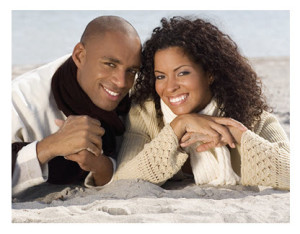Are relationships predictable? Are we bound to follow a set sequence of relationship stages? Can others see a relationship’s demise – or for that matter – its abundance of strengths?
 Theoretically, you could say that life is predictable — certain aspects, anyway — so isn’t it logical that human interactions are reasonably easy to anticipate? From the 10,000 foot view, that is, and possibly in microcosm, depending on the circumstances.
Theoretically, you could say that life is predictable — certain aspects, anyway — so isn’t it logical that human interactions are reasonably easy to anticipate? From the 10,000 foot view, that is, and possibly in microcosm, depending on the circumstances.
The notion that we can classify our most intimate relationships may be another matter.
Personally, I’m not convinced should jump to slot each other and our relationships into a sequential set of stages. Still, having a road map of sorts might help us make better decisions. You know what I mean… reading the signs to predict a budding romance that is likely to become serious, one that will “successfully” lead to marriage or contented cohabitation, or behaviors that indicate we’re headed for trouble unless we stop, reconsider, and do something differently.
Any sort of categorizing is reassuring to most of us. So why not the ability to anticipate stages of love that we can readily observe?
Relationship Stages
Setting aside my skepticism that we can chart our love lives as we might a business project, I would never argue that we don’t “naturally” progress in relationships from those first butterflies through an assortment of obstacles, then on to deeper, sustained feelings. From there, we may pass into familiarity, comfort, and a level of intimacy in which we share trust.
But I don’t see this as consistently linear.
And of course, we may call it quits anywhere along the line — or the other person may do so.
Browsing the Internet, we find all manner of relationship strategies, relationship checklists, and yes — plenty of material on relationship stages, neatly presented to instruct and guide us. Many are formulaic, but then, isn’t that what we’re looking for?
Cues and clues.
Whether to hang on or get out.
Sometimes, commiseration.
Love – Transient? Lasting? Predictable?
If we’re gathering information, we may pick up a thing or two from whatever we read about finding, nurturing, and thriving in our most important relationships. On the other hand, if we’re looking for a guarantee of success, we ought to know better. We can be cruising along calmly for months or years, without a blip. Then again, “life” may have its own ideas, throwing an unanticipated challenge into the mix and storms we cannot weather.
And love at first sight?
We know it happens, and sometimes it evolves into a lasting union. But then there is the nitty-gritty of our daily universe, and the drama of dealing with conflict. And speaking of conflict, Love at First Fight dishes on why some couples endure and others don’t, offering its version of five stages in a relationship, in order that we may be
… better prepared to navigate through each stage successfully and not get “stuck” in any of them…
From Romance Through Bliss
Their stages?
Romance, power struggle, stability, commitment and eventually — bliss. As each stage is described, we learn that couples will likely spend a great deal of time in the first two stages (romance and power struggle).
There is a rather pretty explanation of the chemistry of falling in love, during which
Your drug induced haze forces you to only see where you are similar to your lover, hiding your partner’s flaws and making you say and do anything to get along and please each other.
Of course, we don’t remain in that rosy state forever. At some point, not only are we (and our objets de désir) on our best behavior, but the real “work” begins as we meet reality check after reality check. Not to worry: The pot of gold at the end of the rainbow is that idyllic state of bliss.
Bliss… Really?
 I’m more likely to buy “contentment.”
I’m more likely to buy “contentment.”
Compatibility, Fluidity
9 relationship stages are described by Lovepanky, and I find myself dismayed and confused. For one thing, relationships are more fluid than this progression seems to suggest, although its wisdom presents each stage as a “test of compatibility.”
Lovepanky’s relationship stages progress from the dizzying state of infatuation — ah, romance… what’s not to adore about this stage? — through a more explicit evolution that is described in greater detail. However, I bristle at this statement:
… all relationships will fit snugly in one of these relationship stages.
Hmmm. My marriage did not; not even in the earliest romantic stage, and certainly not as the years progressed. More accurately, there were elements of several stages taking place at once.
Shouldn’t we raise an eyebrow at presuming human interaction to be so easily diagrammed? Shouldn’t we be more focused on the detail in these descriptions, understand how fluid life can be at times, pay attention to the potential “compatibility” issues as we see them, and take it from there — while communicating with our partners?
Are We All So Predictable?
I may dislike any notion that my behaviors (or yours) could be “predictable,” but I recognize many of the relationship stages described in my own experience. And as we chug through the “struggle” stage and into happier periods, apparently we may later encounter a “doubt” stage, in which:
You start to think of your past relationships, your exes, and other prospective partners. You tie your happiness in life with your relationship. If you’re unhappy, you blame it on the relationship.
On an interesting note there is also a “sexual exploration or bust” stage. Hello, Bedroom Boredom… or is this as likely to be life’s tedium and weariness catching up? In the sexual exploration or bust stage, it seems:
… you either give up on passionate sex or constantly look for ways to make sex more exciting
The Importance of Trust
The final stage?
 Complete trust, a designation that seems more rational to me than anticipating “bliss,” but possibly overly optimistic in using the term “complete.” There’s no question that some of us are more trusting than others by nature, and our trust is either well-founded (and we continue to give it), or experience encourages greater reserve in this area.
Complete trust, a designation that seems more rational to me than anticipating “bliss,” but possibly overly optimistic in using the term “complete.” There’s no question that some of us are more trusting than others by nature, and our trust is either well-founded (and we continue to give it), or experience encourages greater reserve in this area.
As for the sequential nature of any set of prescribed steps in a progression involving human beings — I tend to think we are not so tidily sliced and diced, and we may experience elements of any number of these stages — periods of conflict and doubt, periods when expectations are unmet, periods when romance and sexual interest fizzle, followed by a rebirth in each. Even trust can be lost and eventually, with time and effort, won back.
Open Questions, Individual Answers
What about 30 year marriages that go strong for 20 years and then disintegrate? What about being tested by life events and finding character flaws or a varying tolerance for the particular challenges on hand?
What about loving two people at the same time — either out in the open, with a spouse who turns a blind eye, or leading a double life? Or don’t you believe that it’s possible to love more than one person?
How do we know when we can bring the romance back or bring the “sexy” back? How do we know when it’s too late? If both want it, is it never too late?
What about long distance relationships that may delay or accelarate the more usual course of getting to know one another? How are these stages of love affected by the necessity for increased communication and sexual intimacy periodically placed on hold?
How does stage of life play a role? Aren’t our expectations and requirements at age 25 different from 45 or 65? Might we not learn a few things as the years go on, enabling us to identify our most essential needs more quickly, as well as our stumbling blocks?
 What about the role of ego or pride? You say “I’m done” and so you refuse to budge on the subject of giving things another go, in part because you’ve never learned to address and manage conflict effectively. Or do you always cut and run in the “struggle” or conflict stage?
What about the role of ego or pride? You say “I’m done” and so you refuse to budge on the subject of giving things another go, in part because you’ve never learned to address and manage conflict effectively. Or do you always cut and run in the “struggle” or conflict stage?
The Friendship Stage… Forever?
I have a rule that I try to follow, though I have neglected it at times, and shame on me. It is this:
Treat the person you love at least as well as you would your best friend.
After all, we generally share core values with our closest confidantes, we rely on their judgment and their character, we have common interests, we deal with each other in respectful ways, and also important — we laugh, and we have fun.
What if we could ensure a “friendship” stage in our relationships, and we worked to keep it nourished forever?
Sure, any long-term romantic partnership involves the complexities of family obligations, managing money, and sex. But don’t friendships progress through stages? Aren’t they also predictable to some degree? Don’t we go from a rosy state to one in which we see the person more realistically and vice versa, yet the relationship persists? Don’t friendships also require compromise, acceptance, dedicated time, rekindling, and trust?
You May Also Enjoy

Leave a Reply